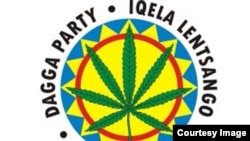JOHANNESBURG, SOUTH AFRICA —
Jeremy Acton is a former pig farmer and, currently, a movie extra based in Cape Town, South Africa. He’s also the 49-year-old leader of the Dagga Party, a small political group that plans to participate in the national elections on May 7.
The movement’s main objective is to get cannabis – known as dagga in South Africa – legalized. Acton is one of many South Africans who have been arrested for possessing marijuana.
He said an attack on the farm on which he grew up in the province of Eastern Cape set him on the path to smoking dagga, and sparked his political venture.
In 2000, a gang of armed robbers stormed the farm store managed by his father and brother.
“They came in shooting and they shot my brother twice, and he went down behind the counter with stomach wounds. And then my father ran out of a storeroom on the side and got shot once through the heart and died…”
Acton’s brother survived, but he said the incident “destroyed” his family. His mother sold the land that he’d hoped to inherit.
Road to poverty and appreciation for cannabis
Severely depressed, Acton wandered South Africa, working on farms. “I know what it’s like to be poor,” he reflected. The attack resulted in Acton developing an affinity with impoverished, landless people, but it also had another consequence: he started smoking cannabis.
“I started using dagga to cope with depression. I found it also eased my allergies and my asthma. But it also helped me to meditate and to solve certain problems in my life,” said Acton, who’s also a trained architect with a graduate degree from Nelson Mandela Metropolitan University.
“People might say, ‘Well, that’s not the way to face your decisions.’ But I always found that it gave me a kind of an inner voice which I could hear more clearly – my conscience, perhaps you could call it.
“By listening to that inner voice I gained the impression that in order to legalize cannabis, you have to politicize it and make it an issue in the face of the oppressor.”
Acton registered the Dagga Party in 2011.
“Every adult should have the legal right to choose whether or not they want to use cannabis,” he insisted.
But in South Africa, choosing marijuana can have severe consequences. Acton said prisons in South Africa are “filled with people whose only so-called crime is to use dagga - innocent people who are just medicating with a health-giving and life-giving plant.”
Health and economic benefits
The authorities brand cannabis a social evil that harms users’ physical and mental health. Acton, who said he’d been in touch with international medical experts to research dagga’s health impacts, vehemently disagrees.
“Cannabis… eases the symptoms of many diseases, such as arthritis and immune problems, diabetes, high blood pressure; the list is endless. This plant confers a longer life and if you have an illness, it enables you to live more effectively while you manage that illness.”
Where it’s legal, doctors prescribe marijuana to relieve pain from serious diseases including cancer and multiple sclerosis.
Acton said cannabis legalization would also be of tremendous economic benefit to South Africa.
“Dagga can replace a lot of expensive medicines,” he maintained. “If one has flu it’s the first thing you should use instead of buying all the pharmaceutical chemicals that you can obtain over the counter.”
He said that hemp ethanol and hemp biodiesel could end the world’s thirst for expensive petrol. “In actual fact, it was always cheaper to produce fuel, liquid fuel, for vehicles from hemp, or cannabis,” he said.
Acton pointed to pioneer automobile maker Henry Ford, who built a car partly from hemp resin and ran the vehicle on ethanol from hemp in the 1920s, calling it the “fuel of the future.” And he mourned a 1937 act of the U.S. Congress that put an end to Ford’s hemp dreams.
“He had a vision of running all the cars that he built on hemp grown by American farmers and it was the Marijuana Tax Act that actually killed that idea so that we citizens of the world now have to buy fossil carbon. And you can see what damage it is doing to our climate. It has polluted the world.”
Corporate conspiracy
Acton said “greedy” global oil, petroleum and pharmaceutical companies have, as a result of their vast financial resources, gained power over government to suppress the value of hemp to protect their own “astronomical” profits.
“So here we are, after all these years, buying fossil carbon from this elite sector. We are prevented from developing the alternative - which is clean, carbon-neutral fuel from cannabis, or hemp,” Acton stated.
His wish is for South Africa to cultivate hemp on a large scale to produce fuel from it to end the country’s dependence on expensive petrol.
“Then this centralized control of energy, literally the fossil carbon industry, it could be completely overthrown by legalization of cannabis,” he said. “The hemp resource must then not be handed over to the corporations to profit from. It must be law that any citizen who wants to participate in cannabis production, in a regulated way, can become producers of energy.”
He added that cheaper fuel would cause the prices of food and most other goods to fall considerably.
Increasing support
Acton maintains that support for the Dagga Party is growing among “all types, all cultural groups, all age groups; elderly [people] who use it for medical reasons, people who have used it to get off alcoholism…
“There’s also very strong support for us in the communities of some of South Africa’s strongest ethnic groups, like the Zulu, Xhosa and Sotho, who for many centuries have used cannabis in their traditional ceremonies.”
He said he is now invited to speak to school children and university students about his organization’s policies and plans.
“The youth of South Africa are fully turned on to cannabis and we see them as our future voters, for their own future,” Acton explained.
He said backing for the Dagga Party is arriving from unexpected quarters. “The Afrikaners; even the white, conservative Afrikaners – I’ve met so many of them who swear by their dagga,” he commented. Acton said his party is also gaining support from white middle class people who were previously “very anti-dagga.”
“Attitudes to cannabis are changing in South Africa very fast and I believe its legalization is just around the corner,” he enthused.
Acton is convinced it’s possible for the Dagga Party to receive enough votes in the 2014 polls to win a seat in parliament or in a provincial legislature.
“That’s like a next step in recognition and getting a foot into places where decisions are made.”
The movement’s main objective is to get cannabis – known as dagga in South Africa – legalized. Acton is one of many South Africans who have been arrested for possessing marijuana.
He said an attack on the farm on which he grew up in the province of Eastern Cape set him on the path to smoking dagga, and sparked his political venture.
In 2000, a gang of armed robbers stormed the farm store managed by his father and brother.
“They came in shooting and they shot my brother twice, and he went down behind the counter with stomach wounds. And then my father ran out of a storeroom on the side and got shot once through the heart and died…”
Acton’s brother survived, but he said the incident “destroyed” his family. His mother sold the land that he’d hoped to inherit.
Road to poverty and appreciation for cannabis
Severely depressed, Acton wandered South Africa, working on farms. “I know what it’s like to be poor,” he reflected. The attack resulted in Acton developing an affinity with impoverished, landless people, but it also had another consequence: he started smoking cannabis.
“I started using dagga to cope with depression. I found it also eased my allergies and my asthma. But it also helped me to meditate and to solve certain problems in my life,” said Acton, who’s also a trained architect with a graduate degree from Nelson Mandela Metropolitan University.
“People might say, ‘Well, that’s not the way to face your decisions.’ But I always found that it gave me a kind of an inner voice which I could hear more clearly – my conscience, perhaps you could call it.
“By listening to that inner voice I gained the impression that in order to legalize cannabis, you have to politicize it and make it an issue in the face of the oppressor.”
Acton registered the Dagga Party in 2011.
“Every adult should have the legal right to choose whether or not they want to use cannabis,” he insisted.
But in South Africa, choosing marijuana can have severe consequences. Acton said prisons in South Africa are “filled with people whose only so-called crime is to use dagga - innocent people who are just medicating with a health-giving and life-giving plant.”
Health and economic benefits
The authorities brand cannabis a social evil that harms users’ physical and mental health. Acton, who said he’d been in touch with international medical experts to research dagga’s health impacts, vehemently disagrees.
“Cannabis… eases the symptoms of many diseases, such as arthritis and immune problems, diabetes, high blood pressure; the list is endless. This plant confers a longer life and if you have an illness, it enables you to live more effectively while you manage that illness.”
Where it’s legal, doctors prescribe marijuana to relieve pain from serious diseases including cancer and multiple sclerosis.
Acton said cannabis legalization would also be of tremendous economic benefit to South Africa.
“Dagga can replace a lot of expensive medicines,” he maintained. “If one has flu it’s the first thing you should use instead of buying all the pharmaceutical chemicals that you can obtain over the counter.”
He said that hemp ethanol and hemp biodiesel could end the world’s thirst for expensive petrol. “In actual fact, it was always cheaper to produce fuel, liquid fuel, for vehicles from hemp, or cannabis,” he said.
Acton pointed to pioneer automobile maker Henry Ford, who built a car partly from hemp resin and ran the vehicle on ethanol from hemp in the 1920s, calling it the “fuel of the future.” And he mourned a 1937 act of the U.S. Congress that put an end to Ford’s hemp dreams.
“He had a vision of running all the cars that he built on hemp grown by American farmers and it was the Marijuana Tax Act that actually killed that idea so that we citizens of the world now have to buy fossil carbon. And you can see what damage it is doing to our climate. It has polluted the world.”
Corporate conspiracy
Acton said “greedy” global oil, petroleum and pharmaceutical companies have, as a result of their vast financial resources, gained power over government to suppress the value of hemp to protect their own “astronomical” profits.
“So here we are, after all these years, buying fossil carbon from this elite sector. We are prevented from developing the alternative - which is clean, carbon-neutral fuel from cannabis, or hemp,” Acton stated.
His wish is for South Africa to cultivate hemp on a large scale to produce fuel from it to end the country’s dependence on expensive petrol.
“Then this centralized control of energy, literally the fossil carbon industry, it could be completely overthrown by legalization of cannabis,” he said. “The hemp resource must then not be handed over to the corporations to profit from. It must be law that any citizen who wants to participate in cannabis production, in a regulated way, can become producers of energy.”
He added that cheaper fuel would cause the prices of food and most other goods to fall considerably.
Increasing support
Acton maintains that support for the Dagga Party is growing among “all types, all cultural groups, all age groups; elderly [people] who use it for medical reasons, people who have used it to get off alcoholism…
“There’s also very strong support for us in the communities of some of South Africa’s strongest ethnic groups, like the Zulu, Xhosa and Sotho, who for many centuries have used cannabis in their traditional ceremonies.”
He said he is now invited to speak to school children and university students about his organization’s policies and plans.
“The youth of South Africa are fully turned on to cannabis and we see them as our future voters, for their own future,” Acton explained.
He said backing for the Dagga Party is arriving from unexpected quarters. “The Afrikaners; even the white, conservative Afrikaners – I’ve met so many of them who swear by their dagga,” he commented. Acton said his party is also gaining support from white middle class people who were previously “very anti-dagga.”
“Attitudes to cannabis are changing in South Africa very fast and I believe its legalization is just around the corner,” he enthused.
Acton is convinced it’s possible for the Dagga Party to receive enough votes in the 2014 polls to win a seat in parliament or in a provincial legislature.
“That’s like a next step in recognition and getting a foot into places where decisions are made.”
From there, said Acton, his cannabis crusade would gain a momentum that would eventually be “unstoppable” and would set an example worldwide for other countries to follow.







